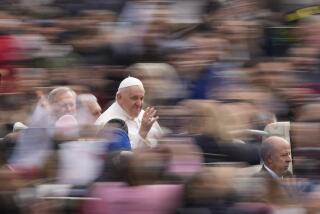Vatican working on relations with China
- Share via
BEIJING — An olive branch extended by the Vatican to the Chinese government over the weekend opens the door for rapprochement between church leaders in Rome and their fractured following in the world’s most populous country.
But before the decades-long rift can be closed, a number of thorny issues must be resolved, including Beijing’s control over church activities, China’s family planning policies and the Vatican’s relationship with Taiwan, which Beijing considers a renegade province.
At the close of a two-day meeting in Rome attended by China’s top bishops, the Vatican announced Saturday that Pope Benedict XVI would send a letter to Catholics in China and would work on establishing diplomatic relations with Beijing. No details were provided on what the letter would say or when it would be delivered. The pope has made relations with China a priority.
Ties between the Chinese government and the Vatican were severed in 1951, after the Communist Party took power. Catholics are now allowed to worship in government-controlled churches that support the pope as a spiritual leader but reject direct papal control. As many as 10 million Chinese attend Catholic services in underground churches allied with the Vatican.
Relations between the government-sanctioned church, the Chinese Catholic Patriotic Assn., and the Vatican have been deteriorating. Last year, the official Chinese church appointed three bishops without papal consent, triggering a strong Vatican rebuke. In the last few months, 17 underground bishops have disappeared, been arrested or detained in isolation, and 20 priests have been arrested, according to Asia News, a Vatican-affiliated news agency.
In its statement, the Vatican referred to the “troubled history of the Catholic Church in China” and expressed its “profound gratitude” to those in China who had “maintained their loyalty ... often paying a grave and painful price by doing so.” But the Vatican also indicated willingness to “continue on the journey of a respectful and constructive dialogue with the governing authorities in order to overcome past difficulties.”
Beijing has been sending “positive signals” that it would like to open a dialogue, spurred by its interest in polishing its image before the 2008 Olympics, according to the statement.
The Vatican has indicated that it would sever its diplomatic ties with Taiwan if the Chinese government agreed to reestablish relations.
Liu Bainian of China’s government-sanctioned church said today that the Vatican’s acknowledgement of Catholicism’s growing popularity in China was proof that “China has religious freedom.” But Liu said any improvement in relations would depend on the Vatican’s willingness to drop its relations with Taiwan and to agree not to “intervene with China’s internal politics.”
More to Read
Sign up for Essential California
The most important California stories and recommendations in your inbox every morning.
You may occasionally receive promotional content from the Los Angeles Times.












